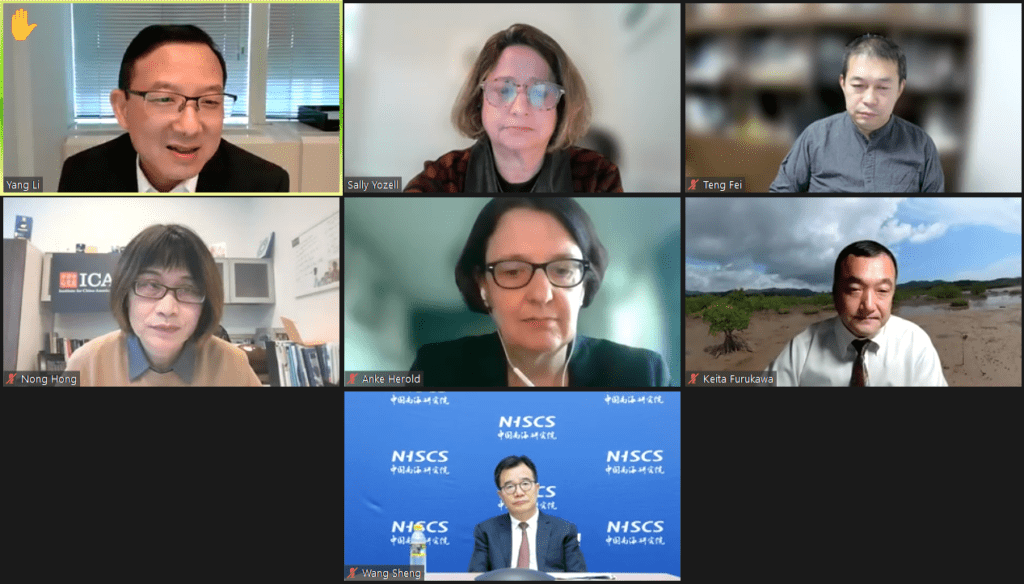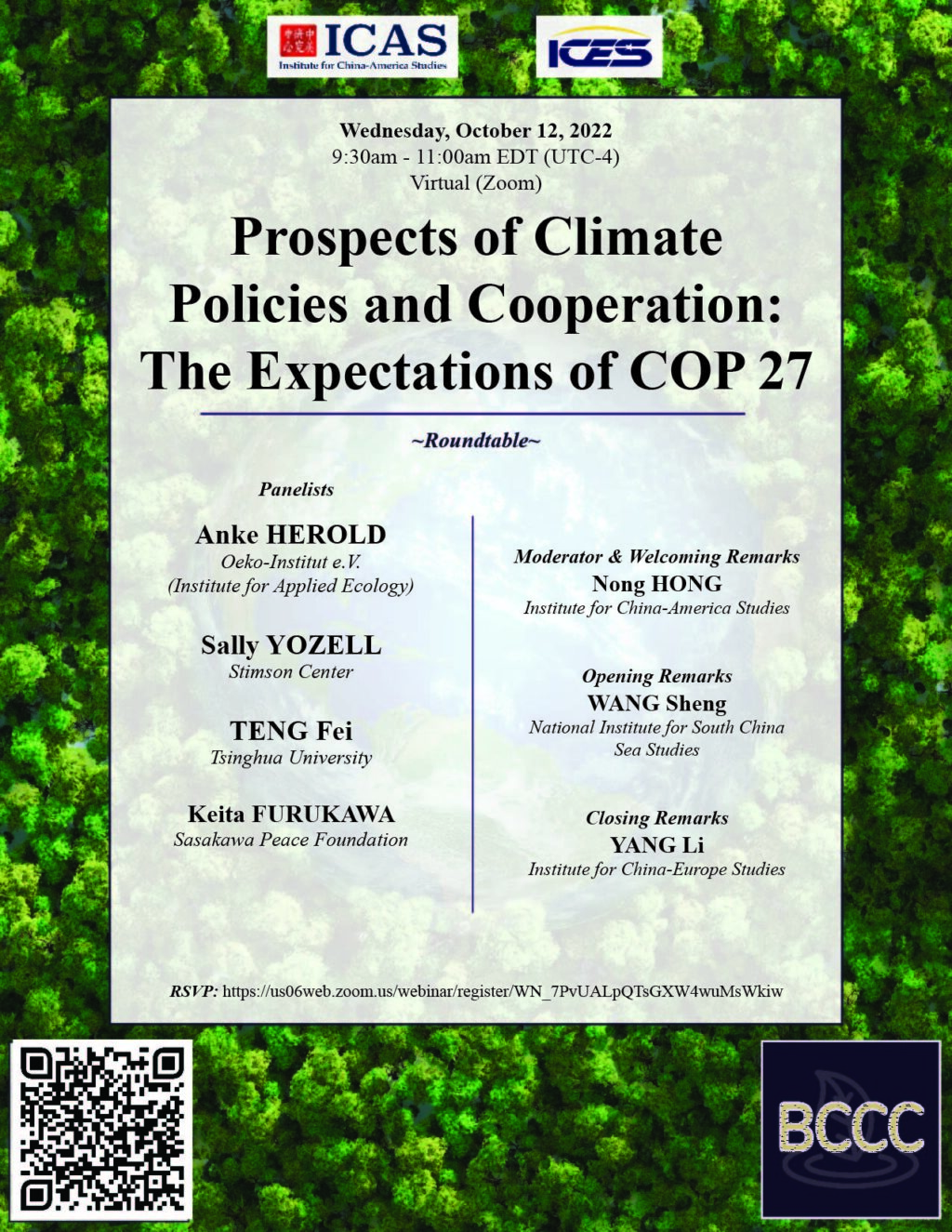

POST-EVENT SUMMARY
On October 12, 2022, the Institute for China-America Studies (ICAS) Blue Carbon & Climate Change (BCCC) Program hosted a virtual public event in partnership with the Institute for China-Europe Studies to discuss the “Prospects of Climate Policies and Cooperation: The Expectations of COP 27.” Featuring expert scholars from the United States, China, Germany and Japan, this event discussed the achievements—as well as deficiencies—of different countries and organizations’ activities in climate affairs since COP26 and explored outlooks for the upcoming COP27 and beyond.
Professor Wang Sheng, President of the National Institute for South China Sea Studies and Senior Advisor of the ICAS BCCC Program, delivered opening remarks. In his remarks, he described responding to climate change and achieving sustainable development as “urgent tasks facing the international community” and offered proposals to promote international cooperation on blue carbon and other key environmental projects. The discussion that followed was moderated by Dr. Nong Hong, Executive Director and Senior Fellow at ICAS, and featured four speakers: Ms. Anke Herold, Executive Director of the Oeko-Institut e.V. (Institute for Applied Ecology Research); Ms. Sally Yozell, Senior Fellow and Director of the Environmental Security Program at the Stimson Center; Dr. Teng Fei, Associate Professor and Deputy Director of the Institute of Energy, Environment, and Economy at Tsinghua University; and Dr. Keita Furukawa, Affiliated Research Fellow at the Ocean Policy Research Institute of the Sasakawa Peace Foundation (OPRI/SPF). The four panelists first discussed climate and environment protection progress post COP26 with a special focus on their respective nations and regions. The panelists then shared their suggestions and comments about future climate change and environment protection work. After a brief interactive discussion time, Mr. Yang Li, Executive Director of the Institute for China-Europe Studies, delivered closing remarks.
Ms. Anke Herold spoke first, noting positive developments in both the Nationally Determined Contributions (NDC) updates to reduce carbon emissions and in the global transition to renewable energy. Nevertheless, challenges have persisted as Europe alone faced a triple energy crisis in 2022—a nuclear one in France, a climate one arising from extreme weather, and third due to the war in Ukraine—though Europe currently has plans in place to expand its climate pledges with relevant bills being in the final stages of the legislative process. Ms. Herold noted that many climate cooperative initiatives have also been announced post COP26, including the Global Methane Pledge and the Glasgow Leaders’ Declaration on Forests and Land-Use. To maximize the promises and address current shortcomings of the initiatives, Ms. Herold proposed that future initiatives include clear commitments from each individual country, a clear schedule for the timelines, transparent monitoring process overseen by independent organizations, as well as periodic evaluation and review. And when asked about major obstacles for international climate initiatives, Ms. Herold pointed out that, as global climate change efforts move towards implementation, it will be difficult to see “big announcements” in the likes of the Paris agreement. Countries need to be honest with what COPs can do, build on existing opportunities and learn and expand successful models and experiences, she concluded.
Ms. Sally Yozell began her presentation by cementing the severity of the issue. With the top 10 climate disasters within the last year costing the US$170 billion, the focus to help communities at home and around the world to adapt to climate change has become a significant addition to the United States government’s agenda. Ms. Yozell spoke to the Biden Administration’s Inflation Reduction Act (IRA) and the United States’ International Climate Finance Plan as evidence to such commitments. Regarding COP27, Ms. Yozell commented on the impact of increased tension among attending nations. With China suspending bilateral climate talks with the U.S. in August and the ongoing Russo-Ukrainian War, there is major uncertainty ahead of the conference. Looking beyond COP27, Ms. Yozell hopes that after the 20th Party Congress of China and the U.S. midterm elections—when political talking points relax—that bilateral relations between the U.S. and China improve and climate cooperation resume. She concluded her presentation by emphasizing the multidimensionality of climate risks and how the Stimson Center’s CORVI helps with addressing this multidimensional problem. With ecological, financial and political risks associated with the climate issues, the U.S. and China should further explore cooperation opportunities, including on how they can collectively help countries across the Global South.
Dr. Teng Fei introduced to the panel China’s climate actions and their latest progress on this issue. For the last two years, China has issued a policy framework that has ultimately enacted a multi-faceted carbon reduction package. Although it is still early to say whether China’s carbon emissions have improved, Dr. Teng noted that there is a consensus by Chinese experts that China’s “carbon emissions have reached a plateau.” China is also incorporating more market-based approaches into its policies to achieve its climate commitments, such as by building the world’s largest carbon market. Regarding the upcoming COP27, Dr. Teng expected extreme weather to be a key issue for China; especially given its impact on developing countries and the need to assist vulnerable regions including Africa. Another issue would be “the accumulating emissions from developed countries,” as Dr. Teng noted that “developed countries have long opposed the idea to compensate for its [historic] emission.” Lastly, Dr. Teng shared a few concerns regarding the G7 Climate Club, especially in connection with the Carbon Border Adjustment Mechanism (CBAM). Believing it to be a “dangerous idea,” Dr. Teng cautioned that “using trade policies as a means to force developing countries to transition…will shift the burden of transition to developing countries” and will ultimately undermine mutual trust and damage the integral effort in the global combat against climate change.
Dr. Keita Furukawa shared Japan’s own climate-related activities and actions over the last few years, identifying blue carbon ecosystem conservation and restoration as an important means for Japan to address climate change as the country expands its climate and carbon emission reduction commitments and pledges. Dr. Furukawa emphasized that current efforts are focused on the creation of a blue carbon market and ensuring that the carbon market contains appropriate and sufficient mechanisms to incorporate diverse kinds of carbon-capture creatures and plants. As an example, Japan’s newly created J-Blue credit system enables the creation of carbon sequestration credits which can be purchased by carbon emitters such as private companies. Although the system is currently voluntary, companies are incentivized to support carbon emission reduction efforts as the purchase of the credits allow them to enhance their branding. Dr. Furukawa also highlighted the importance of strengthening the collaboration between national and local governments and of ensuring the compatibility of climate action and biodiversity. The inclusion of other stakeholders, notably the maritime industries and the academics, in addressing these issues is also essential.
In his concluding remarks, Mr. Yang Li observed that remarkable progress has been made following COP26, thanks to the commitments and efforts exerted by all countries. At the same time, COP27 attendees must also be prepared to address a number of existing and new challenges; from consequences of the war in Ukraine and the increasingly salient climate change consequences to the multidimensional nature of climate crisis and the need for further coordination among stakeholders and actors at all levels.
This event is being held by the Institute for China-America Studies Blue Carbon & Climate Change (BCCC) Program in cooperation with the Institute for China-Europe Studies (ICES).

Background Image Source: Getty Images

